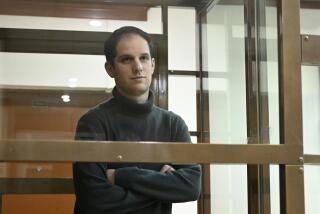Both Sides See Bonn’s Missiles as Major Issue
WASHINGTON — U.S. and Soviet disarmament negotiators agreed Sunday that U.S. warheads on 72 West German missiles remain the chief obstacle to an agreement on destruction of all the superpowers’ land-based intermediate nuclear forces, and a Soviet official said that Moscow is “ready to make a deal” if that obstacle can be overcome.
Appearing on NBC’s “Meet the Press,” chief U.S. negotiator Max M. Kampelman said that disposal of Bonn’s old Pershing 1-A missiles is a decision for the West Germans and North Atlantic allies to make, not a unilateral choice for Washington. Soviet negotiator Alexei A. Obukhov, speaking from Geneva where disarmament talks continue, insisted that there would be no “zero”--a reference to elimination of all mid-range missiles--if U.S. warheads stay on the West German-owned Pershings.
Obukhov accused the U.S negotiators of making “the American warheads on Pershing 1-A’s belonging to the Federal Republic of Germany” into “the main obstacles at the negotiations.”
Both negotiators agreed, however, that the issue might be resolved by a suggested compromise in which the missiles stay in place, with no modernization, until they become obsolete in about five years. Obukhov said the Soviet side would be willing to “study” such a proposal if offered.
“Our position, as of now, and our principal approach is that all the warheads, all American and Soviet warheads on medium and shorter-range missiles must be scrapped in order to have a real, global solution,” the Soviet official said.
Kampelman said the compromise suggestion is “obviously an option that we’ve already been discussing with the Soviets,” although he said U.S. negotiators want to hold to their agenda and “we do not believe the German Pershings are on that agenda.”
Chief Soviet arms negotiator Viktor P. Karpov, speaking from Moscow on CBS’s “Face the Nation,” conceded that “the heart of the matter is not the 72 West German missiles as such. The heart of the matter is the elimination of American warheads, nuclear warheads, for these missiles.”
Karpov grinned, however, when Kenneth L. Adelman, retiring U.S. arms control and disarmament director, chided him for his failure to cite Bonn’s Pershings at a news conference in mid-May, when Karpov listed three obstacles to an intermediate forces agreement.
“Now you are raising this as ‘the’ obstacle,” Adelman pursued. “I predict right now that in a few weeks you’ll have another ‘the’ obstacle. You probably don’t even know what it is, I don’t know what it is and we’ll go on and on and on with the Soviet bluffs.”
Karpov replied that the Soviet delegation had failed to mention the Pershings in May because “we didn’t hear from you that this might be an obstacle.”
The two agreed that the issue of verification, the bugaboo of earlier years of U.S.-Soviet arms control and disarmament talks, is a less serious problem. Karpov said the Soviet Union is willing to permit U.S. inspectors to fly in their own planes to inspect Soviet weapons installations.
“We are open for any inspection which is needed for verification of these agreements on how to eliminate short-range or long-range INF (intermediate nuclear forces) missiles,” the Soviet official said.
“The devil lies in the detail,” Adelman replied. “Ambassador Karpov’s words are very good. If we can get that nailed down, we’re on our way.”
More to Read
Sign up for Essential California
The most important California stories and recommendations in your inbox every morning.
You may occasionally receive promotional content from the Los Angeles Times.










